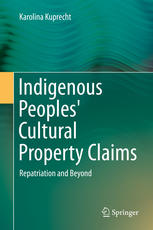

Most ebook files are in PDF format, so you can easily read them using various software such as Foxit Reader or directly on the Google Chrome browser.
Some ebook files are released by publishers in other formats such as .awz, .mobi, .epub, .fb2, etc. You may need to install specific software to read these formats on mobile/PC, such as Calibre.
Please read the tutorial at this link: https://ebookbell.com/faq
We offer FREE conversion to the popular formats you request; however, this may take some time. Therefore, right after payment, please email us, and we will try to provide the service as quickly as possible.
For some exceptional file formats or broken links (if any), please refrain from opening any disputes. Instead, email us first, and we will try to assist within a maximum of 6 hours.
EbookBell Team

4.0
6 reviewsThis book analyses the legal aspects of international claims by indigenous peoples for the repatriation of their cultural property, and explores what legal norms and normative orders would be appropriate for resolving these claims. To establish context, the book first provides insights into the exceptional legislative responses to the cultural property claims of Native American tribes in the United States and looks at the possible relevance of this national law on the international level. It then shifts to the multinational setting by using the method of legal pluralism and takes into consideration international human rights law, international cultural heritage law, the applicable national laws in the United Kingdom, France and Switzerland, transnational law such as museum codes, and decision-making in extra-legal procedures. In the process, the book reveals the limits of the law in dealing with the growing imperative of human rights in the field, and concludes with three basic insights that are of key relevance for improving the law and decision-making with regard to indigenous peoples’ cultural property.